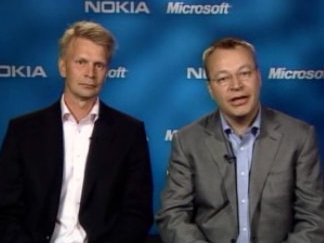Nokia link-up is a win-win for Microsoft
RIM the major target in mobile collaboration

Despite outward appearances, Nokia and Microsoft aren't the most unlikely of bedfellows – the phone giant has co-operated with Redmond several times and already supports Exchange and Windows Live services.
We'd still bet that we'll see a Windows Mobile Nokia handset at some point, but at the announcement of their partnership both parties were quick to stress that Symbian is still very much at the top of Nokia's agenda.
"If you are going to provide a seamless and integrated productivity experience on a mobile device, Microsoft is an ideal partner," said Nokia's Executive Vice President for Devices Kai Öistämö.
But the key announcement is not Microsoft Office on Nokia handsets. It's the stuff beneath the surface fluff; Ian Fogg, Principal analyst at Forrester, tweeted that "Communicator is the key product here, not Word, Excel... so presence, VoIP, contacts etc." The deal also includes access to SharePoint Server via Nokia handsets.
As such, Microsoft and Nokia are tackling one of their major rivals head on: RIM. In the corporate space, Microsoft System Center facilitates huge numbers of phones to be administered centrally. That can now roll out to Nokia's handsets and poses serious questions for RIM and its BlackBerry line.
Creating a formidable challenge
"This is really about creating a formidable challenge to RIM than anyone else," said Öistämö said in answer to a question about Apple's influence on the North American market specifically.
Sign up for breaking news, reviews, opinion, top tech deals, and more.
"The scope of the alliance between Microsoft and Nokia, and potential value for the enterprise and individual is significant," added Stephen Drake, VP of Mobility & Telecom at IDC.
Indeed the "individual" Drake is talking about is a large part of the reason that Nokia has sold 200 million devices
There are still questions for Symbian to mull over. After all, if Nokia and Microsoft become ever-closer who knows what may happen? Nokia's Öistämö admitted the relationship was "only the start."
Leaving that aside, the benefits for both sides are clear. Microsoft has a strategy for the world's most prolific handsets, while Nokia can also tap into the serious corporate market alongside RIM and Windows Mobile OEMs as well as getting involved in Microsoft's massive research and development effort.
It also galvanises both companies against the continuing threat from the mobile new boys, Google and Apple. But whatever impact they can make on the market over the next year, it'll be dwarfed by the amount of Microsoft-influenced handsets. Taking its apps beyond Windows Mobile is a Microsoft win-win.
Dan (Twitter, Google+) is TechRadar's Former Deputy Editor and is now in charge at our sister site T3.com. Covering all things computing, internet and mobile he's a seasoned regular at major tech shows such as CES, IFA and Mobile World Congress. Dan has also been a tech expert for many outlets including BBC Radio 4, 5Live and the World Service, The Sun and ITV News.